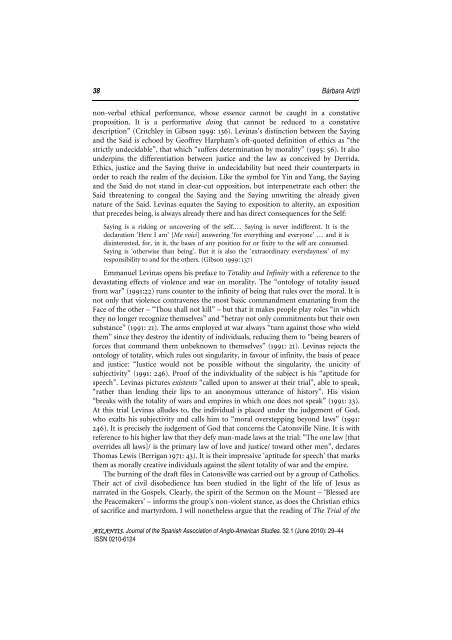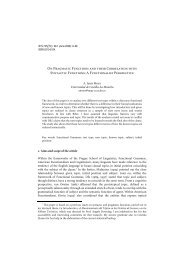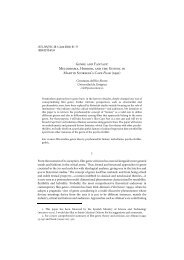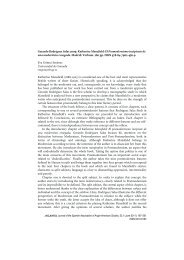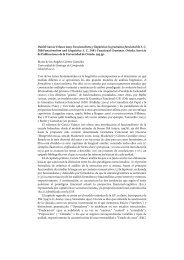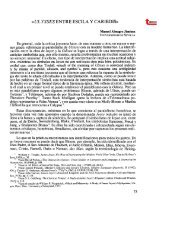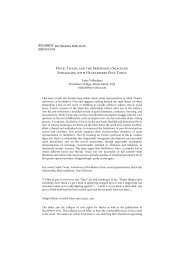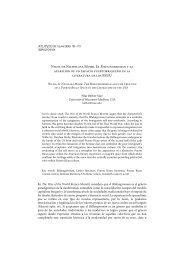Revista de la Asociación Española de Estudios Anglo - Atlantis
Revista de la Asociación Española de Estudios Anglo - Atlantis
Revista de la Asociación Española de Estudios Anglo - Atlantis
You also want an ePaper? Increase the reach of your titles
YUMPU automatically turns print PDFs into web optimized ePapers that Google loves.
38 Bárbara Arizti<br />
non-verbal ethical performance, whose essence cannot be caught in a constative<br />
proposition. It is a performative doing that cannot be reduced to a constative<br />
<strong>de</strong>scription” (Critchley in Gibson 1999: 136). Levinas’s distinction between the Saying<br />
and the Said is echoed by Geoffrey Harpham’s oft-quoted <strong>de</strong>finition of ethics as “the<br />
strictly un<strong>de</strong>cidable”, that which “suffers <strong>de</strong>termination by morality” (1995: 56). It also<br />
un<strong>de</strong>rpins the differentiation between justice and the <strong>la</strong>w as conceived by Derrida.<br />
Ethics, justice and the Saying thrive in un<strong>de</strong>cidability but need their counterparts in<br />
or<strong>de</strong>r to reach the realm of the <strong>de</strong>cision. Like the symbol for Yin and Yang, the Saying<br />
and the Said do not stand in clear-cut opposition, but interpenetrate each other: the<br />
Said threatening to congeal the Saying and the Saying unwriting the already given<br />
nature of the Said. Levinas equates the Saying to exposition to alterity, an exposition<br />
that prece<strong>de</strong>s being, is always already there and has direct consequences for the Self:<br />
Saying is a risking or uncovering of the self.… Saying is never indifferent. It is the<br />
<strong>de</strong>c<strong>la</strong>ration ‘Here I am’ [Me voici] answering ‘for everything and everyone’ … and it is<br />
disinterested, for, in it, the bases of any position for or fixity to the self are consumed.<br />
Saying is ‘otherwise than being’. But it is also the ‘extraordinary everydayness’ of my<br />
responsibility to and for the others. (Gibson 1999: 137)<br />
Emmanuel Levinas opens his preface to Totality and Infinity with a reference to the<br />
<strong>de</strong>vastating effects of violence and war on morality. The “ontology of totality issued<br />
from war” (1991:22) runs counter to the infinity of being that rules over the moral. It is<br />
not only that violence contravenes the most basic commandment emanating from the<br />
Face of the other – “Thou shall not kill” – but that it makes people p<strong>la</strong>y roles “in which<br />
they no longer recognize themselves” and “betray not only commitments but their own<br />
substance” (1991: 21). The arms employed at war always “turn against those who wield<br />
them” since they <strong>de</strong>stroy the i<strong>de</strong>ntity of individuals, reducing them to “being bearers of<br />
forces that command them unbeknown to themselves” (1991: 21). Levinas rejects the<br />
ontology of totality, which rules out singu<strong>la</strong>rity, in favour of infinity, the basis of peace<br />
and justice: “Justice would not be possible without the singu<strong>la</strong>rity, the unicity of<br />
subjectivity” (1991: 246). Proof of the individuality of the subject is his “aptitu<strong>de</strong> for<br />
speech”. Levinas pictures existents “called upon to answer at their trial”, able to speak,<br />
“rather than lending their lips to an anonymous utterance of history”. His vision<br />
“breaks with the totality of wars and empires in which one does not speak” (1991: 23).<br />
At this trial Levinas allu<strong>de</strong>s to, the individual is p<strong>la</strong>ced un<strong>de</strong>r the judgement of God,<br />
who exalts his subjectivity and calls him to “moral overstepping beyond <strong>la</strong>ws” (1991:<br />
246). It is precisely the judgement of God that concerns the Catonsville Nine. It is with<br />
reference to his higher <strong>la</strong>w that they <strong>de</strong>fy man-ma<strong>de</strong> <strong>la</strong>ws at the trial: “The one <strong>la</strong>w [that<br />
overri<strong>de</strong>s all <strong>la</strong>ws]/ is the primary <strong>la</strong>w of love and justice/ toward other men”, <strong>de</strong>c<strong>la</strong>res<br />
Thomas Lewis (Berrigan 1971: 43). It is their impressive ‘aptitu<strong>de</strong> for speech’ that marks<br />
them as morally creative individuals against the silent totality of war and the empire.<br />
The burning of the draft files in Catonsville was carried out by a group of Catholics.<br />
Their act of civil disobedience has been studied in the light of the life of Jesus as<br />
narrated in the Gospels. Clearly, the spirit of the Sermon on the Mount – ‘Blessed are<br />
the Peacemakers’ – informs the group’s non-violent stance, as does the Christian ethics<br />
of sacrifice and martyrdom. I will nonetheless argue that the reading of The Trial of the<br />
ATLANTIS. Journal of the Spanish Association of <strong>Anglo</strong>-American Studies. 32.1 (June 2010): 29–44<br />
ISSN 0210-6124


